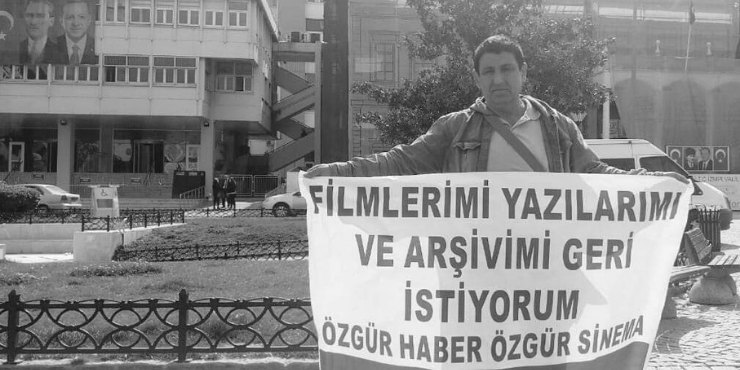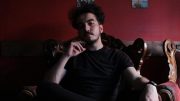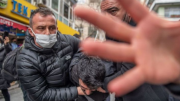SONAY BAN
When we asked him how he defines himself, Oktay İnce stated that he was “first of all, a video activist, documentarian and reporter.” Since 2018, the “insulting the President” lawsuit filed against him on the grounds of his social media posts has been ongoing. His personal audio-visual archive of more than 20 years was confiscated, apart from the raids on his house by the police and the numerous detentions he was taken during the trial.
During the interview we held with him on behalf of the Speak Up Platform, we had a multi-faceted conversation, from the lawsuits brought against him, to the works he did before and after these lawsuits, to how the ways of solidarity and resistance can be established in the cinema industry.
We know that you are a member of Seyri Sokak Video and Documentary Collective. I would like to start by asking how you describe yourself.
In the context of the subject, I can say that I am primarily a video activist, documentarian and journalist. We started video action in 2000; there were death fasts by prisoners against F-type prisons, and there were daily demonstrations in support of this fight in Ankara at that time. We went out with our camera to keep a visual record of the fight and create its memory, and daily; we started to record the struggles for rights on the street on video. The format at that time was Hi8 camera, we were recording on analog tapes. We did not know montage, we wanted to keep the images for the future. Before that time, all recordings were made and kept by the state or by the mainstream media – if we were going to make a documentary, we wanted archives from them. Thus, a group of friends created the Kara Haber Video Action Workshop in 2000. Until 2008-2009, we actively followed the public demonstrations in Ankara. Then this workshop fell into a passive state as the friends dispersed. In 2013, during the Gezi resistance together with the friends who recorded the resistance on the street, we created Seyri Sokak. Since then, we continue the video action. We turn our recordings into documentaries from time to time. On the one hand, we think that we are reporters because we report our recordings as news when necessary, we serve them to websites and television channels.
Were you facing less interference back then?
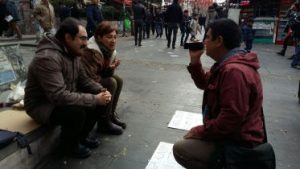
When there was a demonstration or a press release, there were two types of cameras; one is the camera of the police and the other is the camera of the reporters. We became as the third camera. During street resistances sometimes the police thought we were police too, they didn’t call out. We didn’t have any cards or IDs on us. Sometimes police came and asked “Why are you shooting?” At that time, the lie we were telling was “We are filming events on behalf of the Human Rights Association” and we were putting them off.
“GEZİ RESISTANCE MADE A LEAP IN VIDEO ACTION”
Do you think this situation increased during the Gezi period, on the way to 2013? Or can you tell that there is a change since you said, while the police “didn’t bother” you that much before, but now that as you and other video activists or documentarians are going through more difficult processes?
It’s a matter of action-reaction. When we used to record, the recordings were taken on cassette and it took 1-2 days to montage and turn them into short videos. When we opened Kara Haber web site, in 2004 or 2005, we were not providing news services to other sites and organizations until then, so that the police and the state were not disturbed by these recordings. After the Kara Haber website was launched, the police began to follow it. Still, we did not encounter so much reactio, but social media became so important during the 2009 Tekel Demonstrations and then the 2013 Gezi Resistence. Therefore, the fact that the images recorded by the public instantly fell on social media and social media became more important than the mainstream media as an alternative area; following it began to disturb the state. People usually made recordings at Tekel Demonstrations as well, but Gezi Resistance created a leap forward in video action with the start of live broadcasts on mobile phones. Live broadcast portals were created that do not require montage and provide instant images. All the demonstrations, street by street, could be broadcast and watched. From that day on, the state started to feel uncomfortable and wanted to take control of two things as its own face was showed; on the one hand, social media, and on the one hand, recording on the street (via blocking). What is now released as a circular was something that the police actually did on the streets since the Gezi Resistance, even before the circular, de facto with the July 15 restrictions. They were blocking the video activists without ID cards, and they were also blocking the (revolutionary, alternative) press; sometimes by detaining them together with the protesters, sometimes by pushing them away from the street… By creating dark blind spots with shields on Yüksel Street, preventing their shooting… Finally, the circular came. Instant visibility on social media is very important in terms of state intervention.
Your testimony and hearing about this context is very valuable to us, as you have been busy with these works for many years, and you have experienced a lot of things in the transition from analog to digital camera, as well as in the technical part of the job, and also because you are active on the street. I would like come to the period after 2018. We know from the news that you were detained on 16 October 2018 on the grounds of your social media posts. In addition, you mentioned in the news and in the testimonies you wrote that your audio-visual archive, which you have created for more than 20 years, is not given back by the police. Have you ever been detained before this date? Have you experienced similar processes with the state and law enforcement agencies, especially after 2018?
Why was the operation made in 2018. Of course it has a history. After creating the Seyri Sokak Video Action Workshop, we caught the attention of the Ankara police, as it is the only one of its kind in Turkey. Especially in 2016, after July 15, the resistance of public workers started by Nuriye Gülmen is known. In a situation where the press did not follow much, we recorded the resistance on a daily basis, we came face to face with the police twice a day. We recorded that process uninterruptedly for two years until the end of the hunger strike. Sometimes they pushed me aside, but I was detained 20-30 times with the activists, which turned it into fines. I was detained with the activists 12-13 times for opposition to 2911 [Law on Meeting and Demonstration]. We were continuing the live broadcast from the police detention car there – this is the first time in Turkey. Since they could not use their right to speak in detention – it takes 10-15 minutes until they go to the police station – the insurgents were able to give their messages on our live broadcast. Our insistence catched the state’s attention. Earlier, my friend Sibel’s [Tekin] house was raided, they took 10 of her external drives before me.
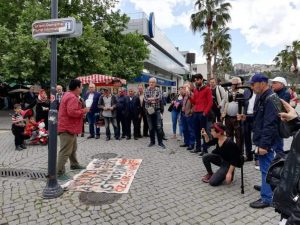 It was when the Turkish Medical Association was raided. I want to open a parenthesis. State’s annoyance of social media and its attempts to control social media [contents] have also turned social media into something they can silence the people they want to suppress or silence. There are things we call “social media operations”, sometimes by chance, sometimes by the method of retrospectively examining the social media of the targeted people or institutions and making up crimes there, sometimes by raiding houses. The same was done to our friend Sibel. At that time, they also conducted retrospective research on Seyri Sokak, and they started an investigation regarding making propaganda for a terrorist organization in their posts, about three people, myself among them. I was in Ankara. That two-year period was always spent with confrontations with the police and detentions. After I moved to Izmir, the investigation was transferred to Izmir; my house was raided. Then they issued a search warrant on the grounds of “making propaganda for a terrorist organization on social media” as well.
It was when the Turkish Medical Association was raided. I want to open a parenthesis. State’s annoyance of social media and its attempts to control social media [contents] have also turned social media into something they can silence the people they want to suppress or silence. There are things we call “social media operations”, sometimes by chance, sometimes by the method of retrospectively examining the social media of the targeted people or institutions and making up crimes there, sometimes by raiding houses. The same was done to our friend Sibel. At that time, they also conducted retrospective research on Seyri Sokak, and they started an investigation regarding making propaganda for a terrorist organization in their posts, about three people, myself among them. I was in Ankara. That two-year period was always spent with confrontations with the police and detentions. After I moved to Izmir, the investigation was transferred to Izmir; my house was raided. Then they issued a search warrant on the grounds of “making propaganda for a terrorist organization on social media” as well.
“WHAT THE STATE WANT IS NOT TREATING LEGALLY IN THESE OPERATIONS, THERE ARE RESULTS THAT IT ACTUALLY WANTS TO ACHIEVE; LIKE SILENCING”
You shared posts about your demonstrations, there were also news published on the subject, but what is the situation lately? How would you comment the process of your demonstrations you are carrying out to get your archive back?
I have not taken my archive back and there is no news. The cases have a period of limitation, but the investigation has no time limit in Turkey. When we look at the investigations on social media, the investigation file was put on the shelf five years ago, but is revived upon need. People are arrested, put in jail. The state keeps these investigations, detentions and materials as potential means of accusation. We are not very active on Seyri Sokak either, but if we come to a position that will catch their attention again, these archives can be used again in order to make up crimes, put us in jail etc. What the state want is not treating legally in these operations, there are results that it actually wants to achieve; like silencing. When it achieves this, it puts us in the sstand-by mode, if we make a sound, it will use it against us. It is also possible to fight against the actual situation. Since I couldn’t get results from some legal applications (I’ll tell you the procedure in parentheses: Normally when they search houses they have to copy and leave the original [materials], legally. Since after July 15, they have already confiscated the phones and external disks of thousands of people, since it is not possible to copy them at home, they have to take them to the police station and return them by copying – they have to copy again). When I did not receive any response for my applications, I started demonstrations and doing press statements in Izmir in April 2019. The first reaction of the Izmir police after the weekly protests I started in front of the governor’s office and the courthouse, was to come up with a New accusation, this time “insulting the President of the Republic” on social media. I started the demonstration on April 2, then I did it on April 9. When I gave the governor’s office the date and place for April 16, they made a social media report on April 11-12, and they called me to the police station on the 16th – the day of the demonstration. When I finished the demonstration, I went, but the first reaction was to try to block the demonstration by [putting forward] social media accusation. It was brought to the agenda, after all. International organizations such as Pen America, etc. became aware of it, and I requested them to write to the Ministries of Interior and Justice. [The letter] given by the Ministry of Interior to the organization with the signature of Süleyman Soylu was “the external disks will be returned as soon as possible after they were copied”. At that time, the Izmir police sent the file to Ankara in order to get rid of this problem. Now the case is in Ankara Chief Public Prosecutor’s Office in Constitutional Crimes. I think the last time was in September 2019, I had a week of demonstration in Ankara, but I couldn’t continue. As soon as the demonstration and making a voice fall off the agenda, the case itself drags on, and there has been no development until today. What I say is if they’re going to copy, they should do it and give my archieve back to me. The digital [materials] belonged not only to me, but also to my family and my wife’s were confiscated. This is already a crime, we have submitted many petitions in order them to give them back, but there is no progress. If there is no resistance, there is no sound, no progress, in short…
There is a series of violations from the beginning to the end, but which issues would you like to underline?
There are digital materials of thousands or millions of people that have been confiscated. They do not leave any house they enter empty-handed. People are acquitted, they decide not to prosecute the investigations, but those materials are taken to the police. They are being watched by people who have no right. They mention about personal data, private life, in the circular. But documents and images belonging to the private lives of millions of people are monitored, kept at hand and copied by the state and the police. This is literally a battleground. For example, some people think, “As long as I get rid of the accusation, no matter whether the material goes away,” for example. He does not consider the special or political significance of the material itself, and it has not turned into a common struggle.
This is an important point. We know that you wrote to Altyazı Fasikül and explained the process. We also made news about the subject on our platform, and even an interview of you was published on our platform in October 2018. However, ARC (Artists at Risk Connection), a subsidiary of the International PEN organization, followed your demonstrations and progress. On Facebook pages, your demonstrations and your case were constantly shared, and your situation somehow was heard in international public. Did you receive support from Turkey regarding the process? For example, people or organizations from the cinema industry?
International organizations wrote letters, they received an official reply from the Ministry of Interior. We held a meeting of filmmakers with Documentarist Film Festival, Altyazı. For the same reason; they take away the external disks – all the hard work – of many of the documentary filmmakers for any reason, while they are making the movie and they can’t get them back, their possibility of making movies disappears. We talked on this with other documentary filmmakers. In both the Filmmakers for Peace and the Against Censorship groups, we keep these issues on our common agenda, that is necessarily on everyone’s agenda. Especially now, the shooting ban circular ignited the issue again.
“DOCUMENTARY CINEMA WILL LOSE ITS OPPOSITION AND RESISTANCE STRENGTH AS IT IS SECTORIZED”
It is important that you bring the subject to documentary cinema, because evidently there are serious inequalities between documentary and fictional cinema practices in Turkey. Apart from the studies you mentioned and the solidarity in the email groups, have you received support from the cinema industry in Turkey?
The sector itself is an obstacle to being a sector. As the documentary cinema becomes a sector, it will lose its opposition and resistance power. The highest response we can actually give is to collect signatures, write the names one after the other and share them on social media. At the time we got together, the Bakur trial was continuing, other Kurdish filmmakers were on trial (Kutbettin Cebe – sentenced, Weysi Altay was sentenced). I remember that we moved to a more active process during the Bakur case as a group that came together, but as a sector, especially when fiction directors get involved – there is a more political resistance on the axis of the documentary. In fiction, however, the obstacles of the state – let’s think about the circular, journalists, citizen reporters, then de facto opposition reporters, and then documentary moviemakers are aimed first at preventing. Fiction moviemakers do not come face to face with the state on the street; their encounter with the state is about the opportunities to be created for them, state supports, etc. A separate world. It is not a world that censorship should threaten, they are already censoring themselves more.
What are the cases pending you are on trial at the moment? On this occasion, we would like to announce your most recent hearings.
I have two cases. One is the case of “insulting the President”: I had my case on May 6, 2021, it was postponed to October 2021 with the closing process. I also had an ongoing case in Sincan. During Nuriye Gülmen’s trial, I was taken into custody and taken away from the court due to my open video recording during the trial, and a lawsuit was filed against me without any authorization. It was part of the fight to expand the space towards the state, as the fight of “How far can we get the camera”. We also do it in detention vehicles. The upper limit for this crime is 6 months. I was sentenced to 2 months for that and it was converted into a fine. I am constantly acquitted of all lawsuits filed in Ankara of 2911, I do not even follow up.
When was the result of the case in Sincan announced?
Although I don’t know the exact date, it was around a month ago, March or April 2021…
Do you have anything to add about censorship in general?
What I would like to add is that with the last circular, if the state is issuing a circular about something it has already done, it means that it will carry its violence on the street beyond this; because the state always applies obstruction and violence far beyond what is legally entitled. This is how we should evaluate it. Secondly, as video activists, our axis of fight according to the areas narrowed by the state is as follows: The state wants to turn into a panopticon; to the point where everyone can be seen but you can’t be seen. That’s why there are cameras everywhere. As video activists, we call it “camera for everyone”. Activating, promoting and encouraging everyone to catch the violations on the street and the crimes of the state with their cameras and phones can be our way of fighting. We were always calling for this on the street.

